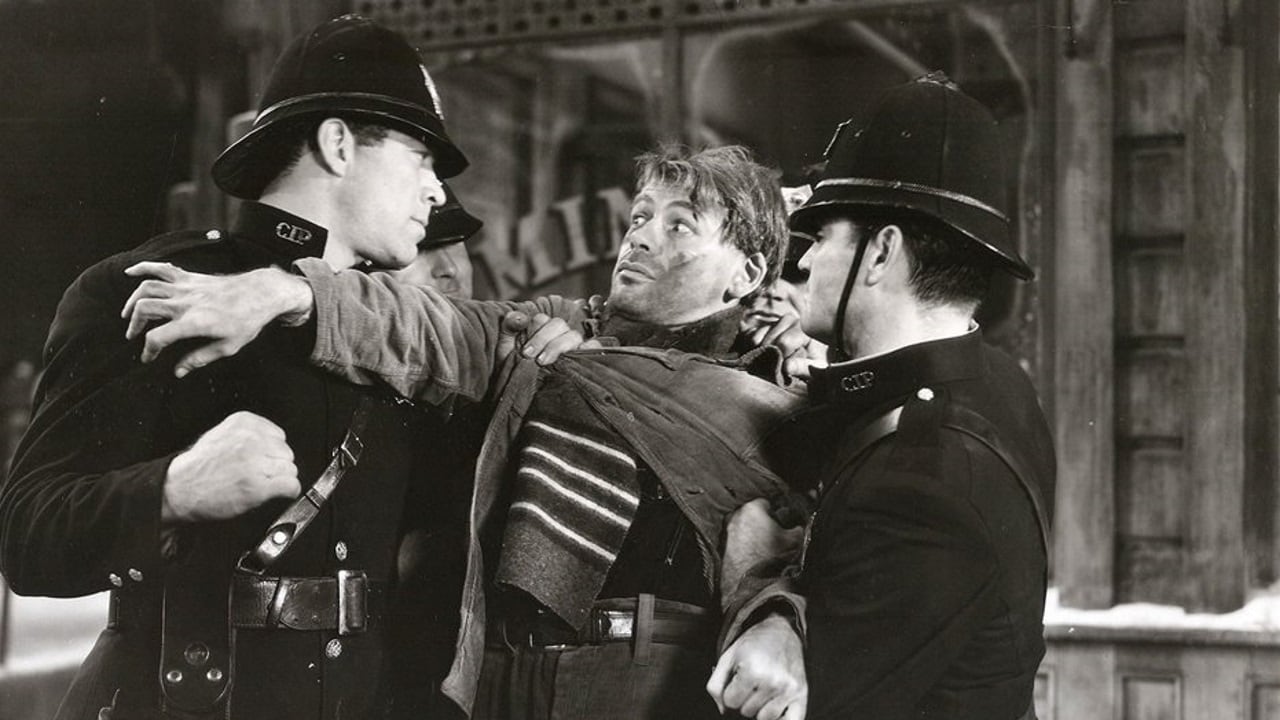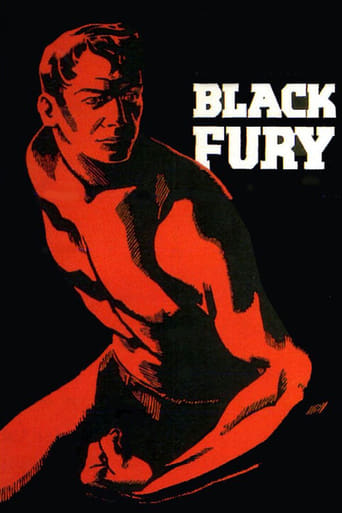



Wonderful character development!
Boring, over-political, tech fuzed mess
The thing I enjoyed most about the film is the fact that it doesn't shy away from being a super-sized-cliche;
View MoreIt's simply great fun, a winsome film and an occasionally over-the-top luxury fantasy that never flags.
View More"Black Fury" was the second film Paul Muni made after signing a lucrative and very unusual contract with Warner Brothers that essentially allowed him script approval and a great amount of creative control. Muni had been fascinated by the true story of a miner's strike in Philadelphia, and did extensive research, including meeting with a judge who had presided over the case.I've seen all of Muni's films repeatedly and this is unquestionably one of his most accomplished and most unusual roles. For an actor who wast trained on the Yiddish stage and often played old men (even as a juvenile), it's remarkable that during the height of his film career, Muni never played a Jewish character. Joe Radek, a Hungarian immigrant, is probably the closest Muni ever came to playing a character that he "could have been" in real life -- he, too, was an Eastern European immigrant, of working-class stock, and had his parents been laborers instead of itinerant performers, he could easily have wound up like Radek. Radek is a child-like, life-of-the-party type who speaks in broken English, often in the third person ("Everybody love Joe Radek!") For students of acting history, it's the type of performance that you might expect from a "method" actor of a generation later; indeed, those who cite Brando's Stanley Kowalski as "breaking the rules" by speaking with a mouth full of food in a realistic fashion would do well to note Muni's performance here, as his speech is sometimes imprecise and in an early scene he breaks up a fight and makes a speech while gnawing his lunch.The script is fairly decent -- although politically problematic, as it seems to go a bit far to get Joe elected as president of the new union, and presents unions as ineffective or corrupt (and management as greedy and uncaring, of course). At the time of its release, the film was well-reviewed, but the "controversy" over unionization meant that it was censored or banned in some areas, so it was not a box-office success. Still, Muni's performance was powerful enough that he received a "write-in" nomination for Best Actor -- a practice that has since been discontinued by the Oscars (Muni and Bette Davis, for "Of Human Bondage," were the only actors to receive write-in nominations).It's also worth seeing for the excellent, uncompromising direction of Michael Curtiz; supporting performances (and they are ALL supporting in a Muni film -- he is unquestionably the star) are all well-played. Karen Morley is understated as Joe's would-be girl; John Qualen, who has one of the saddest faces in movie history, is excellent as Joe's best friend. The film's ending is a bit hackneyed from today's perspective, but quite effective."Black Fury" is one of about four dozen films from before 1936 that "should" be available on DVD, but isn't, and it's a shame. It is occasionally aired on cable and well worth a look if you are a fan of Muni or socially conscious films of the depression era (in the vein of "I Am a Fugitive From a Chain Gang," "The Grapes of Wrath," etc.)
View MoreThe fabulous Paul Muni gives another wonderful performance in this 1935 film.With a genuine Slavic accent, Muni is superb as a coal miner who loses his girl (Karen Morley) to a company Policeman and goes on a drinking binge as a result. It is at this point that a gangster organization tries to create chaos within the union and Muni becomes their perfect foil.J. Carrol Naish is excellent as the worker who works for this unholy organization.Naturally, Muni's best friend is killed in a clash with company police and Muni, now sober, vows revenge.Morley returns to Muni just in time as he goes down into the mine and starts blowing the place up. It's at this point that the film starts to go down, but with Muni's performance and the problems shown of what the coal miners had to endure plus the dishonesty in trying to break the union, all make for a very good film.
View MoreDuring the Thirties Warner Brothers had the reputation of being the working class studio and it was films like Black Fury that made for Warner Brothers that reputation. It was rare indeed to see another studio take stories about ordinary working people. Mostly they concentrated on the middle and upper classes because film was a form of escapism during the Depression. Black Fury coming out as it did in the middle of the New Deal was a timely reminder of the difficulties organized labor faced. Not coincidentally 1935 was the year that the Wagner Labor Relations Act was passed, an effort finally by the government to give labor some kind of equal footing with management. The need of the Wagner Act was to correct some of the abuses shown in films like Black Fury.Paul Muni plays happy go lucky immigrant coal miner Joe Radek. A man admittedly who works hard and no one thinks of as any kind of brain. He gets used good and proper by the company to stir up the miners so they will strike and give the company an excuse to lock out the union and bring in scabs.What you see with those miners living on subsistent wages in company towns was taken right from current headlines. It may be ancient history to us now, but it was very real for those people back in the day. The Pinkertons as represented by brutal and corrupt company policeman Barton MacLane had an unsavory reputation as strikebreakers and enforcers for management. That too is no exaggeration. Muni, aided and abetted by former girl friend Karen Morley now seeing the error of some of her ways, sees what a chump he's been and takes some real direct action against the employers. It's spectacular I'll tell you that.Though his acting style seems to have not worn well with some, not with me mind you, Muni was given a really rare tribute that year. His performance as Joe Radek was the second time a performer had a sustained write-in campaign for him for an acting Oscar. He finished second in the balloting to Victor McLaglen for The Informer and ahead of Mutiny of the Bounty nominees, Clark Gable, Charles Laughton, and Franchot Tone. The following year the Academy banned write-ins and that's been so ever since. Of course the following year Muni won his Oscar for The Story of Louis Pasteur.We've moved on in America from an industrial to an information based society and films like Black Fury are now part of history. But it's a history we should not forget.
View MoreIn 'Black Fury', Paul Muni gives one of his best performances, and also appears on screen in one of his more plausible make-ups. This time he plays a Slavic immigrant, uneducated but keenly intelligent, working in an American coal mine. Muni's hair is dyed blond, yet looks realistic, and his own Eastern European facial features work with this characterisation ... not against it, as they did for some of his other roles. The film also features a fine performance from John Qualen, a prolific character actor whose film appearances were often marred by unconvincing and unnecessary foreign accents of the "yumpin' yiminy!" sort. In 'Black Fury', Qualen's flavour-of-the-month accent is less obtrusive than usual, and it actually works for the character he plays: a Polish-American miner.Joe Radek (Muni) is a miner in a 'company town', where all the labourers are poorly-paid and live in squalid shanties. Radek and his fellow miners work in extremely dangerous conditions. The company that owns the mine also owns all the local businesses, and the local police force also work for the mining company. The cops have no interest in justice: they're bullies whose only concern is to keep the locals quiet and subservient to the company. The head cop is a slimy sadist named McGee, well-played by Barton MacLane. Radek's buddy Shemanski (Qualen) gets drunk one night and makes the mistake of criticising company policy: staggering home that night, he has a fatal 'accident' arranged by McGee's goons.To call attention to various grievances, Radek fills the mineshaft with dynamite. He packs several days' worth of food for himself, then he takes McGee hostage at gunpoint and brings him into the mine. Radek chains McGee to the pit face, slightly out of reach of Radek's food supply. If Radek's demands aren't met, he's going to blow up the mine ... with himself and McGee inside. After they've been in the mine for several days, there's one harrowing shot of the starving McGee chained to the wall, begging Radek for food. The film ends with one of those slam-bang action climaxes that Warner Bros did so well, spiced with some social commentary that doesn't get too preachy.The film boasts an excellent supporting cast, filled with actors who are (mostly) more obscure than usual, which helps us to immerse ourselves in the action. Karen Morley, quietly beautiful, gives a fine performance, and Michael Curtiz (a very underrated director) does his usual superlative work.'Black Fury' is based on a story by Michael A. Musmanno, a Pennsylvania lawyer of Italian descent. Late in his life, Musmanno devoted several decades to writing a book called 'Columbus *WAS* First' (his emphasis), which purported to prove that no European explorers reached the Americas before Columbus. Musmanno's claims for Columbus have long since been disproven, but 'Black Fury' is an excellent film. I'll rate this movie 9 points out of 10.Trivia note: Shortly after this movie was released, Warner Brothers released a Loony Toon starring Porky Pig as a hunter who had a dog named Black Fury. What a shameless plug!
View More